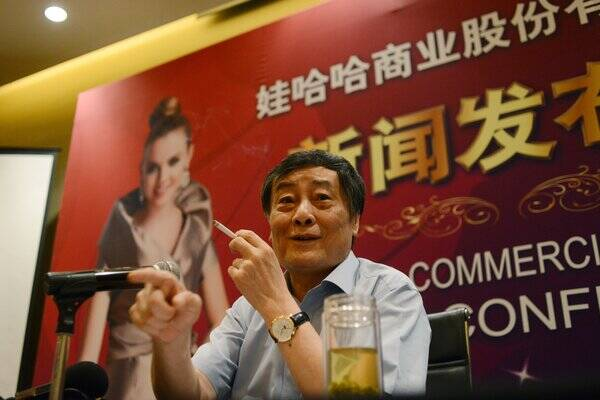纽约时报中文网 - 中英对照版-中英娃哈哈创始人前中国首富宗庆后去世享年79岁
February 26, 2024 4 min 816 words
宗庆后是中国商业领域的一位传奇人物,他的一生充满传奇故事。从贫困走向富裕,宗庆后创办了娃哈哈,成为中国首富。然而,与达能的公开矛盾使他备受关注。这场纷争展现了商业世界的复杂性,揭示了国内外企业间的紧张关系。宗庆后的坚持和反击,最终赢得了对手,使他的公司获得完全控制权。他的去世标志着一个时代的结束,留下了一个由妻子和女儿接手的商业王国。宗庆后的励志故事不仅是中国商业史上的一笔宝贵财富,也对后来者具有启示。他的生平经历和商业智慧将永远激励着追逐梦想的人们。
Zong Qinghou, a self-made beverage entrepreneur who was once the richest person in China, died on Sunday.
白手起家的饮料企业家宗庆后于周日去世,他曾一度是中国首富。
His death was announced by his company, Wahaha Group, which said that Mr. Zong had died from an unspecified illness and gave his age as 79. The company statement provided no further details.
他的死讯由他的公司娃哈哈集团宣布,称他死于一种未指明的疾病,享年79岁。该公司的声明没有提供进一步的细节。
Mr. Zong’s rags-to-riches story had made him prominent in China even before a public feud with his foreign business partner considerably raised his profile — and his wealth. He founded a beverage company in the 1980s, and in the 1990s, he partnered with Danone, the French food giant, to launch one of the best-known food and beverage brands in China.
宗庆后白手起家的故事让他在中国声名显赫,甚至在他与外国商业伙伴的公开不和大大提高了他的知名度和财富之前就是如此。他在20世纪80年代创立了一家饮料公司,并在90年代与法国食品巨头达能合作,推出了中国最知名的食品和饮料品牌之一。
Mr. Zong struck back, saying that Danone had known about the companies. Vowing to punish Danone for its “evil deeds,” he rallied public opinion in China against the foreign company.
宗庆后予以回击,称达能早就知道这些公司的存在。他誓言要惩罚达能的“罪恶”,并在中国召集公众舆论反对这家外国公司。
The dispute grew so acrimonious that France’s president, Nicolas Sarkozy, raised the matter in a meeting with China’s leader, Hu Jintao. In 2009, Danone sold its 51 percent stake, giving Mr. Zong’s company full control.
争端愈演愈烈,法国总统尼古拉·萨科齐在会见中国领导人胡锦涛时也提起了这件事。2009年,达能出售了51%的股份,宗庆后的公司获得了完全控制权。
The following year, Forbes named Mr. Zong the richest man in China, with a fortune of $8 billion. He achieved the distinction again in 2012, with $10 billion. Forbes estimated that his wealth has since sunk to $5.9 billion, placing him at No. 53 on last year’s list of China’s billionaires.
次年,《福布斯》将宗庆后评为中国首富,身家达80亿美元。2012年,他再次以100亿美元的身价登上榜首。《福布斯》估计,自那以后,他的财富降至59亿美元,在去年的中国亿万富翁排行榜上排名第53位。
Survivors include his wife, Shi Youzhen, and their daughter, Zong Fuli, (also known as Kelly Zong), who is the president of the Hangzhou Wahaha Group and Mr. Zong’s successor.
他的遗属包括妻子施幼珍和他们的女儿宗馥莉(英文名Kelly Zong)。宗馥莉是杭州娃哈哈集团的总裁,也是宗庆后的继任者。
Mr. Zong, who grew up poor, was known for a spartan lifestyle. In interviews, he said he arrived at company headquarters before 7 a.m. and worked until 11 p.m. He said he had no hobbies — beyond smoking and drinking Lipton tea.
宗庆后出身贫寒,以简朴的生活方式著称。他在接受采访时说,他早上7点之前就会来到公司总部,一直工作到晚上11点。他说他除了抽烟和喝立顿茶之外没有其他爱好。
According to varying accounts, he was born in October or December of 1945 (his company may have used a traditional Chinese method of counting ages in which a person is considered 1 year old at birth) in or near Hangzhou, a city close to Shanghai. He was among many youths sent to the countryside during the Cultural Revolution, and spent years working at a farming commune.
根据不同的说法,他出生于1945年10月或12月(他的公司可能使用了中国传统的计算年龄方法,人出生时就被认为是一岁),在距离上海不远的杭州市内或市郊。他是文革期间被下放到农村的众多青年之一,在一个农业公社劳动了几年。
He became a traveling salesman in 1978, the same year the country’s new leader, Deng Xiaoping, began ushering in an era of capitalism. About a decade later, Mr. Zong opened a stall near a primary school, hawking soft drinks and iced treats.
1978年,他当上了推销员,同年,国家新领导人邓小平开始开创资本主义时代。大约十年后,宗庆后在一所小学附近开了一个小摊,贩卖软饮料和冰棍。
Seeing hungry children pass by prompted him to invent a vitamin drink, which he called Wahaha Oral Liquid. “It solved the problem of kids who didn’t want to eat and suffered from malnutrition,” he said in a BBC interview.
看到饥肠辘辘的孩子们从身边经过,他发明了一种维生素饮料,命名为娃哈哈口服液。他在接受BBC采访时说:“它解决了孩子们不想吃饭和营养不良的问题。”
The Hangzhou Wahaha Group — “Wahaha” translates loosely to “laughing child”— was born soon afterward, selling bottled water, soft drinks and teas. It later expanded into infant formula and children’s clothing.
不久之后,杭州娃哈哈集团——“娃哈哈”可以大致翻译为“笑哈哈的孩子”——诞生了,它销售瓶装水、软饮料和茶。后来业务扩展到婴儿配方奶粉和儿童服装。
In 1996, it teamed up with Danone, the French food company best known for its yogurt, forming the Wahaha Joint Venture Company. Selling yogurt drinks, carbonated beverages and food products, it had amassed 15 percent of China’s beverage market by 2012, trailing only Coca-Cola and Tingyi Holdings.
1996年,娃哈哈和以酸奶闻名的法国食品公司达能合作,成立了娃哈哈合资公司。该公司销售酸奶饮料、碳酸饮料和食品,到2012年已占据了中国饮料市场15%的份额,仅次于可口可乐和康师傅控股优先公司。
After Danone accused Mr. Zong of misconduct, he fought back with an open letter, accusing Danone of spreading lies about his company’s business practices and slandering his family. Wahaha officials staged rallies and held news conferences denouncing Danone officials as “rascals.”
在达能指控宗庆后行为不当后,宗庆后发表了一封公开信予以回击,指责达能散布有关其公司商业行为的谎言,并诽谤他的家人。娃哈哈官员举行集会并召开新闻发布会,谴责达能管理层是“流氓”。
Danone ended up selling its stake for about $500 million, far less than analysts believed it was worth.
达能最终以约五亿美元的价格出售了所持股份,远低于分析师认为的价值。
The breakup sent a frisson of fear through multinationals, particularly in sectors like car manufacturing, in which the Chinese government required joint ventures and limited foreign companies’ stakes to 50 percent.
拆分给跨国公司带来了恐慌,特别是在汽车制造等行业,中国政府要求成立合资企业,并将外国公司的股份限制在50%以下。
But it proved more an isolated episode than a bellwether, and in retrospect, a mere blemish in an otherwise halcyon era. In recent years, multinationals have encountered other, far more challenging obstacles.
但事实证明,与其说它是一个风向标,不如说它是一个孤立的事件。回想起来,它不过是一个美好时代的瑕疵。近年来,跨国公司遇到了其他更具挑战性的障碍。
Rising geopolitical tensions have led to waves of sanctions between China and the United States. Nearly three years of “Covid zero” lockdowns and other measures badly hurt production and sales for many companies. And China’s state security agencies have become quicker to shut down foreign businesses that concern them, particularly due-diligence firms.
地缘政治紧张局势加剧造成了中国和美国之间的制裁浪潮。近三年的“清零”封锁和其他措施严重损害了许多公司的生产和销售。中国的国家安全机构也在更快地关闭令他们担忧的外国企业,尤其是尽职调查公司。
“It was a high-profile case that got people’s attention,” Ker Gibbs, a former president of the American Chamber of Commerce in Shanghai, said of the Danone episode. “But looking back on it now, it’s clear that the overall environment at that period in time was quite stable and friendly to foreign businesses.”
“那是一个备受瞩目的案件,引起了人们的关注,”上海美国商会前会长克尔·吉布斯在谈到达能事件时说。“但现在回过头来看,很明显,当时的整体环境相当稳定,对外资企业也很友好。”

